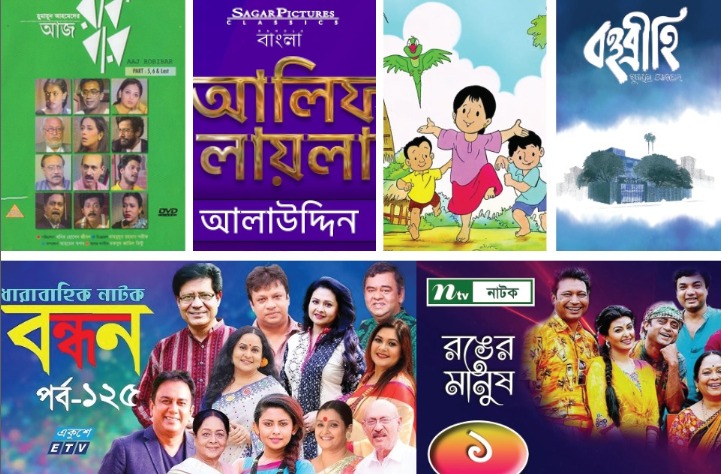
Published :
Updated :

Television first arrived in Bangladesh in the 1960s; it was a wonder to the Bangalees. In those early days, owning a television was a privilege.
My grandparents have told us that when someone in the neighbourhood had a TV set, people from nearby houses would gather to watch whatever was being broadcast on that single channel during the Pakistani period. After independence, Bangladesh Television (BTV) came. Additionally, television was not available in all homes, but neighbours would gather to watch something happening in Bangla.
There was laughter, excitement, and a sense of community around that small box in the corner of the room. It was not just about watching a show; it was about sharing a moment.
If remembered, the period from 1980 to 2000 is often considered the golden era of Bangladeshi television dramas. Those were times when television was not just a medium, it was part of our culture, our evenings, and our emotions.
People would wait a long time to watch their favourite TV shows. Children would complete their lessons early so that they can watch their desired children's shows or cartoons on time.
Today, the generation is far removed from this struggle, yet this emotion remains. With the accessibility of personal devices and the internet, they have their own non-shareable world. Sadly, they won't ever understand the joy of sharing the moment of watching TV with family and friends.
In that regard, the millennials had their best childhood memories of watching television. Shegufa Eram, a private service holder, said, "I was fond of watching television, regardless of what was happening or what was showing. In our childhood, we maintained a routine aligned with the program schedule of BTV. Would watch Alif Layla, Notun Kuri, and Bangla cinemas regularly. Sadly, today's children will not understand it, having so much easy access to phones and the internet nowadays."
BTV was the only channel during those years, but its content was enough to unite the entire nation. Families would gather after dinner, eagerly waiting for the familiar tune that marked the beginning of the nightly drama.
Streets would empty; tea stalls would go quiet. The glow from TV screens would flicker across small townhouses, as people lost themselves in the stories. Also, the dramas were simple yet powerful, reflecting the lives, dreams, and struggles of ordinary Bangladeshis.
With the dawn of the new millennium came a new chapter in Bangladesh's television history. Since the 2000s, private channels have started broadcasting a wide range of events, news, and sports. This period gave us unforgettable shows like Bandhan, Ekannoborti, House Full, Ronger Manush, Romijer Ayna, and many more.
These dramas attracted people of all ages, and everyone enjoyed them together. Special mention goes to Ittyadi, Chayachobi, Notun Kuri, and Meena, as well as Cartoon-like shows. Even the long advertisements were a part of the enjoyment.
During Eid or Puja-like occasions, television channels aired memorable dramas and telefilms. A supplement would accompany the papers, containing schedules of the dramas.
People used to wait for that supplement, and when it was in their hands, they would pick their favourite ones. Later, with families, cousins, and the whole group, they will watch it together, having finger foods in hand. Zahra Zahid, a private bank job holder, recalls, "We would make fuchka and sit in front of the TV, waiting for our favourite actors to appear on Eid. Now, everything is available online. We can watch anything anytime, but that feeling of waiting and watching together is gone."
Her words capture a truth many of us feel. We planned our evenings around the TV schedule. If a favourite show aired at 8:30 PM, everyone made sure to finish cooking early so they could watch it. There was laughter, sometimes tears, but always togetherness.
What truly made those years special was not just the dramas themselves, but the way we watched them. Watching television was a family ritual, a shared joy. There was no 'my show' or 'your show.' It was 'our show.'
Today, the internet has changed everything. We live in a digital era where entertainment is at our fingertips, and YouTube, OTT platforms, and streaming services have replaced the old television sets. We can watch anything, anytime, on any device. There are no schedules to wait for, no interruptions, no limited choices.
Sayeda Sumaya, now studying abroad, once shared how much she misses that sense of connection. "Back then," she said, "television united us. Now, I watch everything on my phone alone. It's convenient, but lonely."
When everyone watches separately, the magic of shared emotion disappears. Families no longer sit together for a nightly drama. Children watch cartoons on their tablets; parents scroll through news or web series on their phones—the living room, once the heart of family bonding, has fallen silent. The sad truth is, like many other things, this ritual will never return; it's gone, gone, and gone.
nawmiafra25@gmail.com


 For all latest news, follow The Financial Express Google News channel.
For all latest news, follow The Financial Express Google News channel.